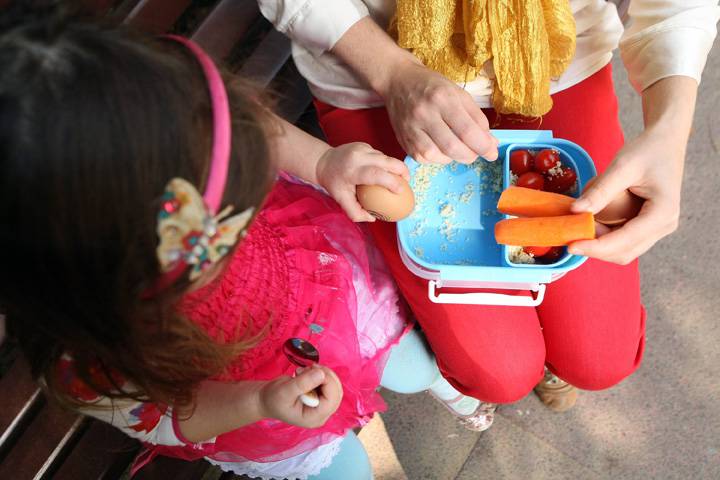Kids as young as three years old call themselves fat, are unhappy with their appearance, and have even turned away food that might make them gain weight, a troubling new report warns.

A quarter of childcare workers polled say they’ve seen kids from three to five years old complain about their weight and what they see in the mirror, according to research out of the Professional Association for Childcare and Early Years — or PACEY — in the United Kingdom.
The report’s authors are pointing their fingers at parents and peers as the biggest reason why their insecurities are cropping up at such a young age. The media doesn’t help either.
“By the age of three or four some children have already pretty much begun to make up their minds — and even hold strong views — about how bodies should look. There is also research evidence to suggest that some four year olds are aware of strategies as to how to lose weight,” Dr. Jacqueline Harding, a PACEY advisor and child development expert, said.
She said parents need to be incredibly careful about how they may be inadvertently signalling to kids how to be self-conscious about their bodies and how they look.
READ MORE: Here’s how parents need to approach teen obesity, eating disorders, according to new guidelines
“There is now mounting concern that the formation of these views — so early on in life — may develop into later eating disturbances or depression,” she said.
Some findings from the report:
- 37 per cent of childcare workers have heard toddlers call themselves fat
- 47 per cent have seen six to 10 year olds grapple with body image anxiety
- 10 per cent of workers have heard kids call themselves ugly, while 16 per cent wish they were better looking
- One in five childcare workers have had kids reject food because “it will make them fat”
- 37 per cent of these professionals interacting with kids think their peers may be their biggest influence, while 32 per cent say it’s their parents
- 25 per cent think it’s the media
Dr. Oren Amitay, a Ryerson University instructor and registered psychologist who works with kids, said he isn’t surprised by the findings.
He said a key influence for young kids is their older siblings, too. While parents may be walking on eggshells to make sure they exude confidence around their kids, toddlers will look up to their big brothers and sisters.
READ MORE: This simple change in school cafeterias could help kids lose weight
At three years old, kids may not fully understand what it means to call themselves fat or fear certain food, Amitay said. But the actions have long-term ramifications.
“A lot of this is mimicry but it sets the stage for later habits. Once you start talking in a certain way, it becomes easier for a child to internalize it as they understand it better,” Amitay said.
“They understand there’s a certain body that’s portrayed as negative and they see there’s a relationship with food,” Amitay warned.
His adult clients grappling with eating disorders, such as anorexia or bulimia, first saw symptoms at an early age.
Kids have grown up with Barbies and Disney princesses, and that’s shaped ideal body image, but social media has been the latest major influence for youth, he said.
READ MORE: Cartoon characters key to influencing kids to eat healthier, studies show
“There’s no doubt that body image issues are media-driven and with social media being so prevalent, it’s not surprising that more people are dealing with this,” Amitay told Global News.
Last month, Stanford University doctors listed a handful of guidelines parents and pediatricians need to adopt to address obesity and eating disorders in kids.
The doctors behind the new set of approaches say they’ve seen it all: teens who have “quick, substantial weight loss” that’s so extreme, they trigger medical consequences such as an unstable heart rate, to others losing control and gaining excess weight.
So what should parents do? Don’t talk about your own weight or your child’s weight in a negative way.
“Mothers who talk about their own bodies and weights can inadvertently encourage their kids to have body dissatisfaction, which we see in half of teen girls and a quarter of boys,” Dr. Neville Golden, a pediatrics professor at the university’s school of medicine, said.
READ MORE: Preschoolers’ eating habits linked to future heart health risks, Canadian study suggests
Body image trouble could lead to relying on vomiting, laxatives and diuretics to control weight.
There’s a difference between talking about weight and what the scale reads and how healthy you feel or how physically fit you are.
If you’re encouraging your kids to take up exercise, don’t make the incentive weight loss. Make exercise a fun, stress-relieving activity so your kids create a positive relationship with working out instead of treating it like a chore.
Read Golden’s full guidelines here.
Read the full PACEY report here.
carmen.chai@globalnews.ca
Follow @Carmen_Chai




Comments